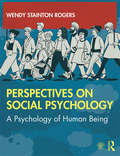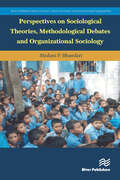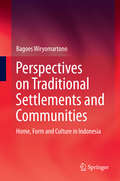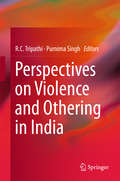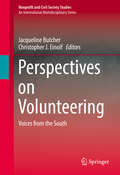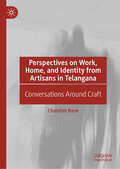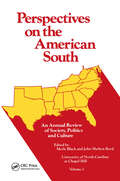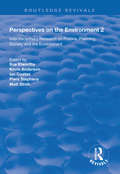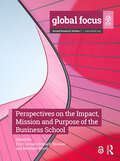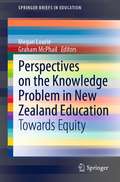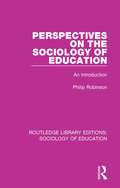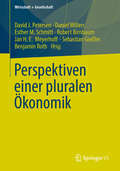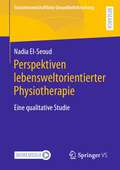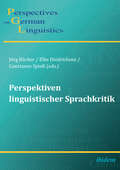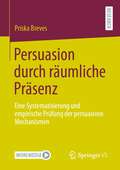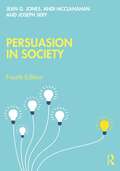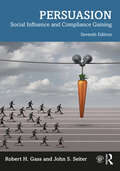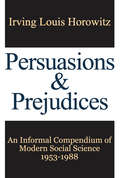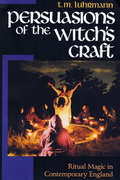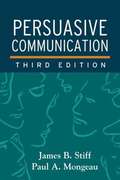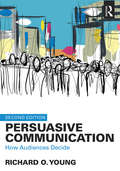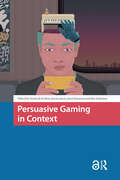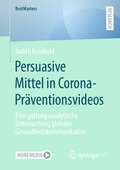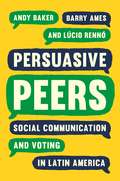- Table View
- List View
Perspectives on Social Psychology: A Psychology of Human Being
by Wendy Stainton RogersThis groundbreaking new textbook takes a different perspective on social psychology, focused on the social and cultural worlds we inhabit, and encompassing a wide range of core social psychology topics – from the self to relationships, gender to health, racism to mental distress. Taking a critical approach, this book explores how qualitative methods and interpretational analyses can be used to examine human behaviour and what it is like living in today’s media-led world. It explicitly challenges all forms of Othering, taking a fresh look at human values, embodiment, agency, communication, thinking and feeling. It goes beyond the individualising scientific approach taken by traditional psychology, instead concentrating on the psychology of what makes us human – qualities like empathy and compassion, courage and dignity, kindness and sympathy – and how we can nurture them. Offering a fascinating alternative to existing resources and enhanced by carefully chosen full-colour illustrations, the book and associated companion website include original pedagogical features such as reflective exercises, further resources and a glossary, offering opportunities for readers to customise their learning experience. Featuring a course mapping section that sets out how the text can be used in relation to psychology curriculum requirements and common course structures, this interdisciplinary resource provides accessible and engaging reading for students studying psychology and other disciplines, including sociology, cultural studies, politics and media studies, as well as applied areas such as nursing, policing and management. It is also for anyone who is interested in what psychology can tell us about our lives and place in the world.
Perspectives on Sociological Theories, Methodological Debates and Organizational Sociology
by Medani P. BhandariThis book stands as the full body of scholarly work on western theories of social sciences. The book contents three chapters. The first part gives the overall scenario of theories, the second part provides the pathway to research destination – the research method, and the third and final part is the destination of the substantive field of study and the roles of international organizations on social, political, economic, environmental regimes creation as well as to other social and development functions of international organizations. Sociology examines the social actors’ activities in society and social problems. Western Scholars have developed many social theories, which address the underlying causes such as social conflicts and inequalities, and many formal and informal social organizations are involved to minimize the challenges of inequalities. The study of social organizations is a relatively new phenomenon in sociology. Broadly its historical root can be traced from Greek civilization (Plato, Aristotle), and it has mostly flourished since the Enlightenment Era. However, empirical studies show that the scientific study of organizations began only from the 19th and 20th century. Among the scholars of these centuries, the contributions of Karl Marx, Ferdinand Tönnies, Émile Durkheim, Ludwig Gumplovicz, Vilfredo Pareto, Max Weber, and Talcott Parsons are considered as pillars of sociology. This book intends to answer the broad and major questions of theories, methods, and the international organization studies in social sciences, particularly in sociology and to provide the basic concepts of social theories, application of methods in research (qualitative), and elaborate the factual reality "why study of international organization is also subject of sociological study". The book presents the perspectives of organizational sociology in way that scholarly readers can see the linkages political sciences, sociology and slightly economic in addressing the roles and issues of the international organizations.
Perspectives on Traditional Settlements and Communities
by Bagoes WiryomartonoThis book covers the relationship between societies and their culture in the context of traditional settlement in Indonesia. The focus of the study is on the search for meanings of local concepts. This study reveals and analyzes the concepts concerning home and their sociocultural strategies for maintaining a sense of community and identity. In this study, identifying local concepts becomes the hallmark and the hub of analyses that explore, verify and establish relations between ideas and phenomena. Based on these relations, this study attempts to capture the reality of the local world that upholds and sustains the communities' values, norms and principles for what they may call a homeland. The book is organized into two parts. Part I describes a cross-regional habitation in Indonesia, while Part II presents four ethnic regions of Indonesia - Sa'dan Toraja, Bali, Naga and Minangkabau. Their unique traditions, customs, beliefs and attitudes serve to provide diversity in terms of their backgrounds and lifestyles, though they share the challenge of sustaining their sense of home in the face of modernity as characterized by changes and developments toward a technologically industrialized society. The central research questions are - What is development in terms of culture and environmental sustainability? How do these communities respond to modernity?
Perspectives on Violence and Othering in India
by R. C. Tripathi Purnima SinghThis volume brings together important and original perspectives from South Asia on the relationship between violence---an increasingly important issue in multicultural societies---and the process of othering. The contributors state that societies create 'others' through deliberate acts of selection over a period of time. The objective of the process of othering is to deny rights and privileges that one sets for one's own group. This volume affirms that central to the understanding of violence in any society is the understanding of othering processes. Violence and nonviolence are influenced by the nature of othering processes as well as the kinds of others in a society. Groups engaged in mutual othering are also the ones that are often involved in violent relationships. Renowned scholars from diverse fields provide multidisciplinary perspectives on violence and othering, discussing the concepts of violence and nonviolence in multicultural societies, communal harmony, constructions of the other, truth commissions, state censorship of 'sensitive' issues, fundamentalism and secularism in multifaith societies, and specific cases from recent violence-prone areas. This volume focuses on the South Asian, and more specifically, the Indian context, but is relevant for researchers seeking to understand these issues anywhere in the world.
Perspectives on Volunteering
by Jacqueline Butcher Christopher J. EinolfThis volume overlooks the distinct expressions and awareness of volunteering in the lived reality of people from different regions of the world. By casting the net widely this book not only expands the geographic reach of experiences, models and case studies but also transcends the conventional focus on formal volunteering. It highlights institutional forms of volunteering specific to developing nations and also describes volunteering that is more loosely institutionalized, informal, and a part of solidarity and collective spirit. As a result this book provides a different look at the values, meaning, acts and expressions of volunteering. The chapters in this book consist of essays and case studies that present recent academic research, thinking and practice on volunteering. Working from the premise that volunteering is universal this collection draws on experiences from Latin America, Africa including Egypt, and Asia. This book focuses on developing countries and countries in transition in order to provide a fresh set of experiences and perspectives on volunteering. While developing countries and countries in transition are in the spotlight for this volume, the developed country experience is not ignored. Rather the essays use it as a critical reference point for comparisons, allowing points of convergence, disconnect and intersection to emerge.
Perspectives on Work, Home, and Identity From Artisans in Telangana: Conversations Around Craft
by Chandan BoseProviding an ethnographic account of the everyday life of a household of artisans in the Telangana state of southern India, Chandan Bose engages with craft practice beyond the material (in this case, the region's characteristic murals, narrative cloth scrolls, and ritual masks and figurines). In situating the voice of the artisans themselves as the central focus of study, simultaneous and juxtaposing histories of craft practice emerge, through which artisans assemble narratives about work, home, and identity through multiple lenses. These perspectives include: the language artisans use to articulate their experience of materials, materiality, and the physical process of making; the shared and collective memory of practitioners through which they recount the genealogy of the practice; the everyday life of the household and its kinship practices, given the integration of the studio-space and the home-space; the negotiations between practitioners and the nation-state over matters of patronage; and the capacities of artisans to both conform to and affect the practices of the neo-liberal market.
Perspectives on the American South: An Annual Review of Society, Politics, and Culture
by Merle Black John Shelton ReedFirst Published in 1981. In Perspectives on the American South we hope to gather, yearly, essays that deal with the society, politics, and culture of the region. This first book in the series contains 27 articles, representing the work of some 30 scholars, and including the disciplines of history, sociology, anthropology, political science, and geography. The papers have been organized around four broad topics: violence in the region, southern politics, comparative studies of the region, and the South’s ethnic and cultural groups.
Perspectives on the Environment: Interdisciplinary Research Network on Environment and Society (Routledge Revivals)
by Kevin Anderson Ian Coates Piers Stephens Sue Elworthy Matt StrohPublished in 1995, the essays in this book are papers presented to the second conference of the Interdisciplinary Research Network on the Environment and Society (IRNES) held in Sheffield in September 1993. It follows "Perspectives on the Environment" (ed. Holder et al, 1993, Avebury) to continue the dissemination of the work of IRNES members to a wider audience. Part I explores the social dimensions of environmental technology in the form of an examination of the construction of global climate models, a critical analysis of the discourses associated with agricultural biotechnologies and the environmental implications of building technologies. Part II explores national and international politics of the environment in Britain, the Ukraine and Burma, Thailand and Indonesia. Part III deals with planning for sustainability in Japan and Britain. Part IV examines theories of democracy and the state both nationally and in the form of the European Union's principle of subsidiary.
Perspectives on the Impact, Mission and Purpose of the Business School (EFMD Management Education)
by Howard Thomas Matthew Wood Eric CornuelWith contributions from some of the leading thinkers in business school education, this book explores the impact and purpose of the business school, and addresses some of the most important questions facing management education today. The diverse perspectives brought together by the EFMD in this volume examine a number of common questions, themes and challenges. These include: whether business schools should be viewed as schools of management, given the complexity of the business environment; what is the positive impact of business school research, and the balance of relevant, practical impact and academic rigour; the strategic evolution of business schools and how they may evolve in a more purposeful direction; and why business school leaders compete strongly but are reluctant to collaborate, and how collaboration may encourage greater positive societal impact. With insightful commentary and illustrative case studies, this book serves as a landmark publication on the value and impact of business schools. The book will be of particular interest to those working in business schools, higher education leaders, policy makers and business leaders seeking insight into the value, impact and future of business and management education.
Perspectives on the Knowledge Problem in New Zealand Education: Towards Equity (SpringerBriefs in Education)
by Graham McPhail Megan LourieThis book offers new ideas for thinking about how more equitable outcomes might be achieved in New Zealand so that all students are well-equipped to live and work in contemporary society. It addresses a social justice concern about access to the unique affordances of subject knowledge which comprises two forms of knowledge - propositional (knowledge-that) and applied knowledge (know-how-to).The book provides perspectives on curriculum design by grounding arguments in a theory of knowledge. It describes the different knowledge forms of the theory, and argues that understanding these differences is significant for curriculum design and enactment. It explains why the current imbalance between knowledge forms is a problem, and offers suggestions for change. Understanding about knowledge itself enables more just and equitable outcomes for all students. This book illustrates how different knowledge types and forms can be used together productively to help students develop adaptive expertise for the 21st century, making it a valuable contribution to the field of education.
Perspectives on the Sociology of Education: An Introduction (Routledge Library Editions: Sociology of Education #45)
by Philip RobinsonFirst published in 1981, this book provides a basic introduction to the sociology of education. It brings together many of the principal arguments in order to help the student reach an understanding of the multitude of conflicting opinions, theoretical positions and biases within the field. The work considers the structures within which the child, the family and the classroom are located, focusing on the theory and the ways in which they can be used to explain the workings of the educational system. It introduces not only the work of classical educational sociologists such as Durkheim, Weber and Marx, but also more recent scholars such as Halsey, Becker and Althusser. With a global coverage, the book emphasizes the implications of the developments of the sociology of education for educational policy.
Perspektiven einer pluralen Ökonomik (Wirtschaft + Gesellschaft)
by Robert Birnbaum Benjamin Roth David J. Petersen Daniel Willers Esther M. Schmitt Jan H. E. Meyerhoff Sebastian GießlerDer Sammelband zeigt einerseits die Vielfalt und das Potential einer pluralen Ökonomik auf, indem einführende Überblicke sowie exemplarische Vertiefungen von ökonomischen Perspektiven und Diskursen erfolgen. Andererseits versteht er sich als Debattenimpuls, bei dem auch die grundsätzliche Frage nach der Relevanz und Verantwortung einer Wirtschaftswissenschaft und -praxis in den Fokus gerückt wird, die sich den Herausforderungen dieser Zeit adäquater zu stellen vermag. Es werden zentrale wissenschaftstheoretische, ökonomische und gesellschaftliche Kritiken, Herausforderungen und mögliche Lösungsansätze diskutiert.
Perspektiven lebensweltorientierter Physiotherapie: Eine qualitative Studie (Sozialwissenschaftliche Gesundheitsforschung)
by Nadia El-SeoudNadia El-Seoud analysiert die lebensweltlichen Bezüge der Physiotherapie und geht der Frage nach, wie sich Lebensweltorientierung gegenwärtig in der Physiotherapie darstellt. Hierzu befragte sie praktisch tätige Physiotherapeuten und Physiotherapeutinnen mittels qualitativer, problemzentrierter Interviews und konkretisiert die Ergebnisse u.a. anhand der Bildung von Idealtypen. Insgesamt wird deutlich, dass Physiotherapeut*innen wichtige Gesundheitspartner*innen sein können, die durch den Einbezug der psychosozialen Ebene und den damit einhergehenden Bezügen zur Lebenswelt der Menschen nicht nur zur Gesundheit Einzelner, sondern auch zur Gesundheit von Bevölkerungsgruppen und damit zur gesundheitlichen Chancengleichheit beitragen können.
Perspektiven linguistischer Sprachkritik
by Jörg BückerThis volume provides a collection of new perspectives on linguistic aspects of language criticism. It aims to offer a systematic account of the linguistic dimensions of all complex actions and discourses that can be the subject of critical language theory, which tries to link language and society. In contrast to conventional language criticism, the linguistic branch builds its conditions on the basis of a systemic analysis of its objects of inquiry. Its main goal is the formation of a linguistic awareness regarding the criterion of appropriateness with view of situational, contextual, and cultural factors.The contributions in this volume reflect the multitude of different factors of and interrelations between linguistic aspects of language criticism. They show the extent to which critical linguistic practices impact societal issues and discourses but also how they function in everyday and institutional contexts such as new media and face-to-face interactions. They also discuss the didactic challenges and opportunities that come with the teaching of language criticism in schools and universities.This book is primarily aimed at linguists as well as lecturers and teachers but also at general readers interested in all aspects of language criticism.
Perspektiven zur Professionalisierung des Praktizierens: Fortbildung und Beratung für fachfremde Grundschul-Musiklehrpersonen
by Steven SchiemannIn Anlehnung an die „Schlüsselkategorien der Verständigen Musikpraxis“ (vgl. Jank, 2014; Rora & Wiese, 2014) werden das vokale und instrumentale unterrichtliche Musizieren speziell vor dem Hintergrund der Schlüsselkategorie des „Praktizierens“ fokussiert. Die Professionalisierungsmaßnahmen führten beim Praktizieren der fachfremden Musiklehrpersonen entweder zu einer Steigerung der Oberflächenmerkmale, wie z.B. Musikraumnutzung und Einsatz von Instrumenten, oder aber vereinzelt zur Entwicklung von Elementen von Tiefenstrukturen, wie bspw. Angebot geeigneter lernunterstützender Handlungen. Eine gleichmäßige Steigerung von Oberflächen- und Tiefenstrukturen beim Praktizieren konnte nicht beobachtet werden. Günstige Voraussetzungen für die Professionalisierung des fachfremden Praktizierens, welche sich aus dieser Studie ergaben, sind demnach: aktives privates Musizieren, hohes allgemeindidaktisches Wissen und langjährige Berufserfahrung als Grundschullehrkraft. Die weitere Forschung steht vor der Frage kritisch zu überdenken, was man von fachfremden Musiklehrpersonen „verlangen“ kann bzw. darf, ohne sie zu überfordern.
Persuasion durch räumliche Präsenz: Eine Systematisierung und empirische Prüfung der persuasiven Mechanismen
by Priska BrevesDie persuasive Wirksamkeit immersiver Botschaften wurde schon mehrfach empirisch nachgewiesen. Die räumliche Präsenz wurde dabei als Mediator der Effekte identifiziert – wie genau dieser Persuasionsmechanismus allerdings abläuft, ist bisher ungeklärt. Daher wird die bisherige Forschung rund um die Wahrnehmung der räumlichen Präsenz in diesem Buch aufgearbeitet und systematisiert. Unterschiedliche Ansätze und Theorien werden dabei miteinander in Verbindung gesetzt und die Vermutungen anhand von drei empirischen Laborexperimente geprüft. Die Ergebnisse werden im Anschluss durch ein konzeptuelles Persuasionsmodell miteinander verbunden und ausführlich diskutiert.
Persuasion in Society
by Jean G. Jones Andi McClanahan Joseph SeryThis fully-updated fourth edition introduces readers to the rich tapestry of persuasive technique and scholarship, interweaving perspectives from rhetoric, critical theory, and social science and applying their insights to practical political, social, and business contexts. This text examines current and classical theory through the lens of contemporary culture, encouraging readers to explore the nature of persuasion and to understand its impact in their lives. Employing a contemporary approach, it draws from popular culture, mass media, social media, advertising, political campaigns, and social movements to help readers become informed creators and consumers of persuasive messages. Case studies show how and why people fall for persuasive messages, demonstrating how persuasion works at a cognitive level. This new edition includes extended treatment of the ethics of persuasion, including opposing views on handling controversial issues in the college classroom; a new chapter on propaganda and ideology; and a greater focus on digital contexts and social media. Discussion questions, exercises, and key terms are provided for each chapter. This textbook will be a valuable tool for students of communication, media studies, politics, psychology, and business and advertising. Online resources for instructors include PowerPoint slides and test bank.
Persuasion: Social Influence and Compliance Gaining
by John S Seiter Robert H GassThe seventh edition of this field-leading textbook provides an accessible and rigorous presentation of major theories of persuasion and their applications to a variety of real-world contexts. In addition to presenting established theories and models, this text encourages students to develop and apply general conclusions about persuasion in real-world settings. Along the way, students are introduced to the practice of social influence in an array of contexts (e.g., advertising, marketing, politics, interpersonal relationships, social media, groups) and across a variety of topics (e.g., credibility, personality, deception, motivational appeals, visual persuasion). The new edition features expanded treatment of digital and social media; up-to-date research on theory and practice; an increased number of international cases; and new and expanded discussions of topics such as online influencers, disinformation and 'fake news,' deepfakes, message framing, normative influence, stigmatized language, and inoculation theory. This is the ideal textbook for courses on persuasion in communication, psychology, advertising, and marketing programs. Instructors can also use the book’s downloadable test bank, instructor’s manual, and PowerPoint slides in preparing course material.
Persuasions and Prejudices: An Informal Compendium of Modern Social Science, 1953-1988
by Irving HorowitzReview essays and statements written for special occasions may reveal as much about the writer as those written about; this is the presumption undergirding this collection of thirty-five years of criticism and commentary by Irving Louis Horowitz. For this volume, he selected his comments on famous, near famous, and infamous sociologists, political scientists, and assorted literary figures in between. Taken as a whole, this volume will surprise and delight readers who are acquainted with Horowitz's other works as well as those who are interested in the people he writes about.The book covers notable social scientists, from Arendt to Zetterberg, and such major figures in between as Becker, Bell, de Jouvenel, Mills, Parsons, Solzhenitsyn, and more than eighty others who have had an effect on the contemporary social and political landscape. Each is critically examined, sometimes positively, other times negatively. Horowitz was a major figure in his own right, and his writing here displays the kind of refreshing frankness experts will expect and the general reader will appreciate.The underlying assumption behind the volume, giving its disparate parts a unified characteristic, is that together these observations on others amount to a general perspective on social science held by the author. Whether his larger ambition is accepted or disputed, there is no doubt that the volume provides a standard against which to measure the literary quality of writing in the world of professional social research.
Persuasions of the Witch’s Craft: Ritual Magic in Contemporary England
by T. M. LuhrmannTo find out why reasonable people are drawn to the seemingly bizarre practices of magic and witchcraft, Tanya Luhrmann immersed herself in the secret lives of Londoners who call themselves magicians. She came to know them as friends and equals and was initiated into various covens and magical groups. She explains the process through which once-skeptical individuals—educated, middle-class people, frequently of high intelligence—become committed to the ideas behind witchcraft and find magical ritual so compellingly persuasive. This intriguing book draws some disturbing conclusions about the ambivalence of belief within modern urban society.
Persuasive Communication, Third Edition
by Paul A. Mongeau James B. StiffProviding an accessible integration of theory and research methods, this text prepares students to critically analyze persuasive appeals and to design effective messages and campaigns. The book draws on key ideas from both communication and social psychology to explore the mutual influence of cognitive and affective processes and the characteristics and production of messages. It gives the reader a solid grasp of foundational issues in persuasion research, the core components of persuasive transactions, and major theoretical models. Instructive concrete examples illustrate applications of the concepts in such settings as health promotion, political campaigns, the courtroom, and advertising. New to This Edition *Engaging topic boxes on college drinking, attitudes about same-sex marriage, the "birther" movement, and other timely issues. *New or expanded discussions of the integrative model of behavioral prediction, the use of guilt appeals, social media, individualized tailoring of political messages, and numerous other topics. *The latest data and theoretical perspectives. *Epilogue on current and future trends in the field.
Persuasive Communication: How Audiences Decide
by Richard O. YoungThis updated and expanded edition of Persuasive Communication offers a comprehensive introduction to persuasion and real-world decision making. Drawing on empirical research from social psychology, neuroscience, business communication research, cognitive science, and behavioral economics, Young reveals the thought processes of many different audiences—from investors to CEOs—to help students better understand why audiences make the decisions they make and how to influence them. The book covers a broad range of communication techniques, richly illustrated with compelling examples, including resumes, speeches, and slide presentations, to help students recognize persuasive methods that do, and do not, work. A detailed analysis of the emotions and biases that go into decision making arms students with perceptive insights into human behavior and helps them apply this understanding with various decision-making aids. Students will learn how to impact potential employers, clients, and other audiences essential to their success. This book will prove fascinating to many, and especially useful for students of persuasion, rhetoric, and business communication.
Persuasive Gaming in Context (Games and Play)
by Ben Schouten Joost Raessens Teresa de la Hera Jeroen JanszThe rapid developments in new communication technologies have facilitated the popularization of digital games, which has translated into an exponential growth of the game industry in recent decades. The ubiquitous presence of digital games has resulted in an expansion of the applications of these games from mere entertainment purposes to a great variety of serious purposes. In this edited volume, we narrow the scope of attention by focusing on what game theorist Ian Bogost has called 'persuasive games', that is, gaming practices that combine the dissemination of information with attempts to engage players in particular attitudes and behaviors. This volume offers a multifaceted reflection on persuasive gaming, that is, on the process of these particular games being played by players. The purpose is to better understand when and how digital games can be used for persuasion by further exploring persuasive games and some other kinds of persuasive playful interaction as well. The book critically integrates what has been accomplished in separate research traditions to offer a multidisciplinary approach to understanding persuasive gaming that is closely linked to developments in the industry by including the exploration of relevant case studies.
Persuasive Mittel in Corona-Präventionsvideos: Eine gattungsanalytische Untersuchung globaler Gesundheitskommunikation (BestMasters)
by Judith ReinboldIn diesem Buch werden 199 Videoclips, in denen Gesundheitsbehörden aus 17 Ländern Corona-Präventionsmaßnahmen nahelegen auf persuasive und gestalterische Mittel hin untersucht. . In einer soziologischen, qualitativ orientierten Medienproduktanalyse kristallisieren sich vier wesentliche inhaltliche Überzeugungsmittel heraus, nämlich sachliche Informationen, soziale Einflüsse, Zukunftsszenarien und Furchtappelle. Im Rahmen einer Gattungsanalyse werden diese als variable Merkmale der Binnenstruktur erfasst, die auf eine neu entstehende kommunikative Gattung bzw. Form (Corona-Präventionsvideos) hindeuten.
Persuasive Peers: Social Communication and Voting in Latin America (Princeton Studies in Global and Comparative Sociology)
by Barry Ames Andy Baker Lúcio RennóHow voting behavior in Latin America is influenced by social networks and everyday communication among peersIn Latin America’s new democracies, political parties and mass partisanship are not deeply entrenched, leaving many votes up for grabs during election campaigns. In a typical presidential election season, between one-quarter and one-half of all voters—figures unheard of in older democracies—change their voting intentions across party lines in the months before election day. Advancing a new theory of Latin American voting behavior, Persuasive Peers argues that political discussions within informal social networks among family members, friends, neighbors, coworkers, and acquaintances explain this volatility and exert a major influence on final voting choices.Relying on unique survey and interview data from Latin America, the authors show that weakly committed voters defer to their politically knowledgeable peers, creating vast amounts of preference change as political campaigns unfold. Peer influences also matter for unwavering voters, who tend to have social contacts that reinforce their voting intentions. Social influence increases political conformity among voters within neighborhoods, states, and even entire regions, and the authors illustrate how party machines use the social topography of electorates to buy off well-connected voters who can magnify the impact of the payoff.Persuasive Peers demonstrates how everyday communication shapes political outcomes in Latin America’s less-institutionalized democracies.
